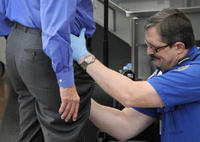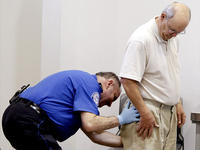-
House representatives battle for control of TSA
Representatives Pete King (R-New York) and John Mica (R-Florida) are battling for control over jurisdiction of the Transportation Security Administration (TSA); currently, King’s Homeland Security Committee oversees TSA as airport security checkpoints are manned by DHS employees — making TSA the only government transportation agency that Mica’s Transportation and Infrastructure Committee does not have jurisdiction over; last week Mica introduced an amendment that could place TSA under his committee’s control by moving to require TSA to hire private contractors to conduct airport screenings, thus removing DHS from the equation — and from King’s jurisdiction
-
-
New detection system uses ultraviolet light to spot explosives
More than 625 million travelers will take to the air before 2011 is over; the passengers’ carry-on luggage and checked baggage are screened for explosives — but University of Florida researchers say there is a better way to do so; the UF scientists say they have developed the first explosive detection system in the world that utilizes ultraviolet light to zero in on specks of dangerous explosives found in and on luggage; the explosives detection market is estimated to exceed $3 billion in the U.S. alone
-
-
Justice Department threatens to cancel flights to Texas
Last week, Texas lawmakers were forced to back away from a bill that would have outlawed airport pat-downs after the U.S. attorney general’s office threatened to cancel flights to Texas; the Texas House passed a bill that would have made it illegal for Transportation Security Administration (TSA) agents from conducting thorough pat downs at airport security checkpoints unless they had probable cause; the U.S. attorney general said that the law would be unconstitutional, and if passed, TSA would be forced to cancel flights to Texas
-
-
Scientists continue to raise doubts about safety of full body scanners
The controversy over the Transportation Security Administration’s (TSA) body scanners lingers on as scientists continue to question the safety of these devices that expose millions of people to trace amounts of radiation; TSA officials maintain that their full body x-ray scanners are safe as they only expose individuals to negligible amounts of radiation, the equivalent of two minutes of flying; despite these assurances, a group of five scientists recently sent an open letter to the White House Science advisor; the scientists argue that the tests used to validate TSA’s claims contain critical flaws, lack transparency, and have not been independently verified
-
-
Texas House prohibits intrusive airport pat downs

The Texas House of Representatives approved a bill that would make invasive pat downs at airports a crime; pat down procedures that would be covered under the measure are inspections that touch the anus, sexual organ, buttocks, or breast of another person including through the clothing, or touches the other person in a manner that would be offensive to a reasonable person; the law would not be enforceable since state legislatures have no authority over federal agencies such as the TSA
-
-
EU proposes recording all data on airline passengers, including their meals
To help combat terrorism, the United Kingdom hopes to join a European Union information sharing database; under the proposed program, dubbed the Passenger Name Record directive, authorities will collect detailed information on airline passengers including their phone number and how they paid for their ticket as well as a credit card details and billing addresses; a passenger’s information will be stored up to five years and after the first thirty days the details will be made anonymous; any European Union member state can search through the database as it conducts counter-terrorism investigations; the proposal has yet to be approved and has generated its fair share of critics
-
-
TSA pats down eight-month-old baby
A photo of Transportation Security Administration (TSA) agents patting down an eight-month old baby at Kansas City International Airport is the latest viral internet sensation in the ongoing criticism of TSA security procedures; the photo shows TSA screeners searching the baby while the mother holds the child in her arms; the photo was posted on Twitter on 7 May and since then has been viewed more than 200,000 times; after reviewing the incident TSA said it followed proper protocol
-
-
Dayton installs automated baggage screening system at airport

On 17 May Dayton International Airport in Ohio will begin using a sophisticated new automated baggage screening system that will save time and resources; using a series of machines, the new system will automatically screen luggage for explosives; any suspicious bags will be flagged and sent to security screeners for more careful examination; TSA officials hope that the new machines will help reduce check-in times for passengers, increase efficiency, and even minimize the number of screeners needed
-
-
TSA launches smartphone app to make travelling easier
To help make a passenger’s airport experience more pleasant and to minimize delays at checkpoints, the Transportation Security Administration (TSA) recently launched its MyTSA smartphone app; the app will provide travelers with official answers to the most commonly asked questions regarding security procedures at airport checkpoints; it also allows users to determine what they can or cannot bring, see airport delays in real-time, and estimate how long waits are at checkpoints; it is currently available for free on the Apple iPhone
-
-
Critical safety and security flaws in airplane maintenance outsourcing
A recent study found that airlines outsourcing their maintenance work could prove to be a major security gap and result in unreliable planes; the Transport Workers Union found that when major U.S. airlines outsource their work they have little training, oversight, or safety measures in place to ensure that the workers they hire perform quality work and do not pose a security threat; at least one member of al-Qaeda has been found working in a major maintenance facility in Singapore in 2003; the lack of training and certification could also result in shoddy airplane repair work; there are only 100 FAA inspectors for over 700 overseas maintenance facilities
-
-
TSA will provide a tracking number for those calling to report suspicious activity
Air travelers who call the TSA Contact Center (TCC) to report suspicious activity will now receive a tracking number as confirmation of their phone call or e-mail; the tracking number, which enables both TSA and the individual to follow-up on their security concerns if necessary,
-
-
Cancer survivor fights TSA after pat down ruptures urine bag

After receiving a particularly rough pat down at an airport security checkpoint by a Transportation Security Administration (TSA) screener, a Michigan man with a lingering medical condition is still upset about what he perceives as a lack of progress in properly screening individuals with special health needs; TSA officials met with the man after an aggressive pat down caused his urostomy bag to rupture, spilling its contents all over his shirt and pants; three months after the meeting, the man has seen no follow through on any of the issues that were discussed and he is beginning to feel a bit disheartened
-
-
Airline crews to get separate TSA screening process
The Transportation Security Administration (TSA) recently announced that it will begin a pilot program that tests a new separate screening process for airline pilots and flight attendants; to expedite airport security lines, airline pilots and flight attendants would not have to go through the same lines as passengers; the specifics of the system are currently in development, but TSA officials say that they are exploring the use of biometric retina scans or fingerprint matches to verify an individual’s identity against airline employee databases; many pilots objected to TSA’s increased search procedures believing that they were a nuisance and entirely unnecessary as they already have full control over the plane
-
-
GAO: TSA's behavior screening program has no scientific proof that it works
Last week a Government Accountability Office (GAO) official testified before Congress stating that the Transportation Security Administration’s (TSA) behavioral analysis program contained critical flaws; the Screening of Passengers by Observation Techniques (SPOT) program was designed to identify potential attackers by analyzing an individual’s behavior; individuals involved in six terrorist plots have slipped by behavior detection officers (BDOs) unnoticed at least twenty-three times at airports where SPOT was implemented; currently there is no scientific evidence that proves potential terrorists can be identified by behavior alone; GAO recommends freezing the SPOT program’s budget at current levels to save an estimated $20 million each year until scientific evidence for the program is established
-
-
Airports personnel don't report suspicions, mistrust technology
An in-depth study of the behavior of security personnel at European air terminals, finds that only 23.6 percent of airport employees and 58 percent of security workers said that they alerted others when they saw something suspicious — and that 54.3 percent of the workers and 40 percent of security personal never raised the alarm or called a security code; only 53.1 percent of airport employees and 63 percent of security workers said they put complete trust in security technologies
-
- All
- Regional
- Water
- Biometrics
- Borders/Immig
- Business
- Cybersecurity
- Detection
- Disasters
- Government
- Infrastructure
- International
- Public health
- Public Safety
- Communication interoperabillity
- Emergency services
- Emergency medical services
- Fire
- First response
- IEDs
- Law Enforcement
- Law Enforcement Technology
- Military technology
- Nonlethal weapons
- Nuclear weapons
- Personal protection equipment
- Police
- Notification /alert systems
- Situational awareness
- Weapons systems
- Sci-Tech
- Sector Reports
- Surveillance
- Transportation
Advertising & Marketing: advertise@newswirepubs.com
Editorial: editor@newswirepubs.com
General: info@newswirepubs.com
2010-2011 © News Wire Publications, LLC News Wire Publications, LLC
220 Old Country Road | Suite 200 | Mineola | New York | 11501
Permissions and Policies
Editorial: editor@newswirepubs.com
General: info@newswirepubs.com
2010-2011 © News Wire Publications, LLC News Wire Publications, LLC
220 Old Country Road | Suite 200 | Mineola | New York | 11501
Permissions and Policies
